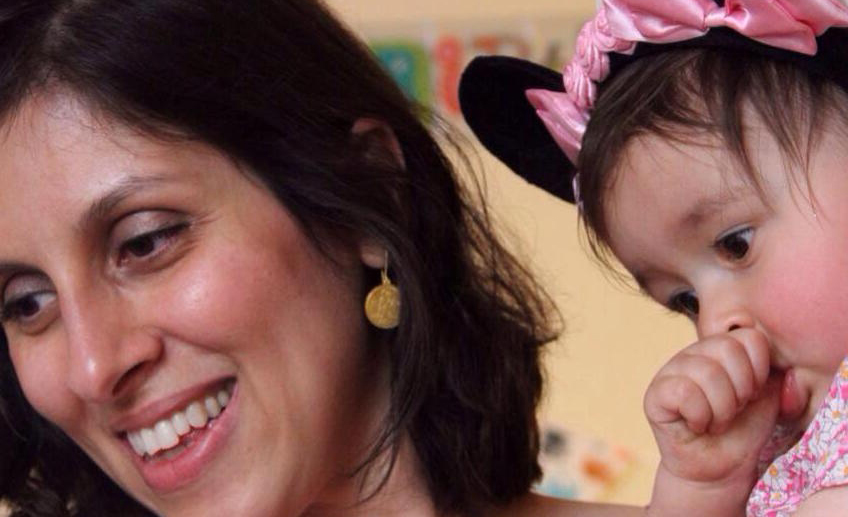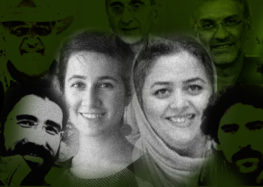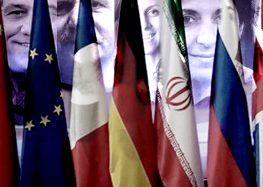Authorities Reverse Decision to Release Detained Dual National Nazanin Zaghari-Ratcliffe

Richard Ratcliffe’s hopes were dashed when he found out that his wife, a British-Iranian dual national who has been detained in Iran without legal representation since April 3, 2016, wasn’t going to be released after all.
Ratcliffe told the International Campaign for Human Rights in Iran that Nazanin Zaghari-Ratcliffe had telephoned her family in Iran on June 9, 2016 informing them that she had been told she was going to be released “and then, after she did that, someone called her parents and said: ‘there has been a mistake, we are changing things, and she is being transferred.’”
“So it seems to me like there was a fight within the Revolutionary Guards about what to do,” said Ratcliffe, whose wife was arrested at Tehran Imam Khomeini International Airport on her way back home to the UK on April 3, 2016.
Their infant child, Gabriella Zaghari-Ratcliffe—who was in her mother’s care at the time of Zaghari-Ratcliffe’s arrest—has since been living with her grandparents in Tehran. The passport of the baby, who only holds British citizenship, was confiscated when she was separated from her mother at the airport.
Zaghari-Ratcliffe had been transferred from Kerman Prison to Evin Prison in Tehran on June 6 and was allowed visitation with her daughter and mother on the same day, Ratcliffe told the Campaign. The first time Zaghari-Ratcliffe was allowed to see her family along with her 22-month old baby was during the second week of May 2016, well over a month after her imprisonment.
“They were taken to a hotel, and [Zaghari-Ratcliffe] was actually brought to the hotel to meet them,” he said. “When she met [her family] at that hotel, she wasn’t able to stand up she was so weak. She couldn’t walk without getting a blackout. She wasn’t able to pick up her baby, and our baby had to be put on her lap, she was so weak.”
“I think she was stronger after that,” he said.
Ratcliffe added that although a lawyer who has agreed to represent his wife has been introduced to the Revolutionary Guards for approval, Zaghari-Ratcliffe has still not been granted access to legal counsel.
“Her father has talked to a lawyer…but I don’t think she has had access to that lawyer yet,” he said. “She was given the name of a lawyer, and she took the name of the lawyer to the Revolutionary Guards, and they said they were going to check to see if they would approve it or not.”
“It seems to me like this is not a legal process at all, just a political one,” he added. “I think she is being used as a pawn in the political games between different parties in the government.”
Accused of Plotting Regime Change
Zaghari-Ratcliffe, a project coordinator for the Thomson Reuters Foundation, the news agency’s charitable arm, was returning to the UK with her 22-month-old daughter when she was arrested at Tehran’s main international airport on April 3, 2016. She had travelled to Iran on March 17, 2016 to visit her family during the Persian New Year holiday.
The 37-year-old new mother has since been accused of partaking in a plot to overthrow the Iranian government.
“It’s crazy that they would accuse a woman with a baby of being the mastermind of anything!” Ratcliffe told the Campaign.
In a statement issued on June 15, 2016, the Islamic Revolutionary Guards Corps’ (IRGC) Sarallah Headquarters in Kerman Province said that “Through membership in foreign companies and institutions, [Zaghari-Ratcliffe] was participating in the design and implementation of media and cyber projects [aiming for the] soft overthrow of the sacred Islamic Republic.”
The statement also alleged that Zaghari-Ratcliffe “headed one of the main obstinate networks that have continued their criminal activities during the past few years, under the guidance and support of media and foreign government spy services.”
“In conclusion, it should be noted that during her detention period Ms. Zaghari was held inside a suite in the Kerman Prison, and was allowed regular telephone calls and visitations with her family,” continued the statement. “Presently her case has been sent to Tehran for judicial processing, and the IRGC Intelligence Organization agents are currently conducting additional investigations.”
A source from the UK Foreign Office told Reuters on June 15 that the British government was “urgently seeking information from the Iranian authorities” and had “raised this case repeatedly and at the highest levels and will continue to do so at every available opportunity.”
Asked whether he was aware of any efforts by the British government to secure his wife’s release Ratcliffe said: “I don’t think the British authorities have made any contact with [Iran’s] Judiciary yet, they have only made contact with the Ministry of Foreign Affairs, so they haven’t heard from the Judiciary,” said Ratcliffe. “Next week I will be going to… London to see what they can tell me.”
Targeting Dual Nationals
Following Zaghari-Ratcliffe’s arrest, the arrest of Iranian-Canadian scholar Homa Hoodfar on June 6, 2016, also a dual national, was the latest in a string of arrests and prolonged detainments of dual nationals who have travelled to Iran.
“The things they said about her [Homa Hoodfar] are similar [to my wife’s] case,” Ratcliffe told the Campaign. “There appears to be a lot of cut and paste… Three women [Nazanin Zaghari, Nazak Afshar, and Homa Hoodfar] were taken while on holiday.”
“[Their arrests] had nothing to do with what any of them had done,” he added. “[My wife] went to Iran four times since our baby was born, seven or eight times over the past five to six years, and had no issues before this.”
“It’s just clear fantasy,” he said.






